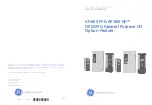
15
15
ENGLISH
5. MAINTENANCE
1. Periodically check cable status. If the ca-
ble seems to have broken wires or crushing,
replace immediately with a new one. Never
use the lifting tower with cables in bad con-
ditions. Only use galvanized steel under EN
12385-4. Cable maximum load: 652kg. Cable
torsion resistance: 1.690 N/mm². Cable dia-
meter: 3mm. Cable composition: 7x19+0.
2. The lifting tower is supplied fully greased
from factory. Nevertheless, the crown gear of
the winch, to the threaded bar of the stabili-
ser outriggers and the profiles, because of its
use periodical greasing is recommended.
WARNING:
DO NOT GREASE OR LUBRICATE
BRAKING MECHANISM
Braking disks were greased with a special
heat and pressure resistant grease. No other
product must be used to prevent negative in-
fluence on brake functioning.
3. Lifting tower NEMESIS 80, must be chec-
ked by an expert a minimum of once a year
as per its use.
4. Only original spare parts must be used to
ensure continued safe use. The user loses all
guarantee rights if spare parts other than the
originals are incorporated or the product is
modified in any way.
5. To request any spare part, contact the
manufacturer or an authorised distributor
within your territory.
6. SPECIFIC RISKS
Braking system failure
May occur due to braking system deficien-
cies or bad installation. If it stops working
it could cause a serious risk due to the rai-
sed load being out of control and may injure
users or hit materials next to the tower.
Loss of stability
If the tower is placed on a sloping ground or
a surface that is not completely flat, there is a
risk of losing stability which would lead to a
90º overturn with risk of serious injuries for
workers.
Objects dropping to a different level
As an elevation equipment and due to its
working height, there is a serious risk of
raised objects dropping to a different level,
either due to securing mechanism failure,
part wear, dirt, etc., or incorrect use of the
lifting tower (E.g.: for goods over the maxi-
mum load allowed). Sudden drop of raised
goods implies a serious risk for the worker.
Knocks and/or contusions due to objects
This risk only occasionally causes an accident
to the worker running the operation due to
his location during the elevation process; the
risk of knocks from a raised element is more
likely to affect people walking by or whose
workplace is next to the lifting tower.
Its origin may be due to a loss of stability,
malfunctioning of structural elements, safety
systems, securing systems, etc.
Summary of Contents for NEMESIS 80
Page 2: ...2 2 ...
Page 17: ...17 T1 T2 T3 T4 ...
Page 18: ...18 1820 1308 1013 1091 1037 1084 3007 2x 1025 2X 1079 1871 3109 1820 2x 1404 2149 T1 T2 ...
Page 20: ...20 NOTAS NOTES LIFTING TOWERS ...
Page 21: ...21 NOTAS NOTES LIFTING TOWERS ...
Page 22: ...22 NOTAS NOTES LIFTING TOWERS ...
Page 23: ...23 NOTAS NOTES LIFTING TOWERS ...










































